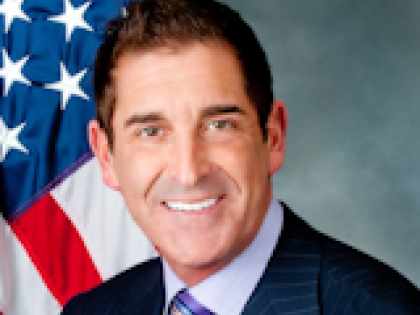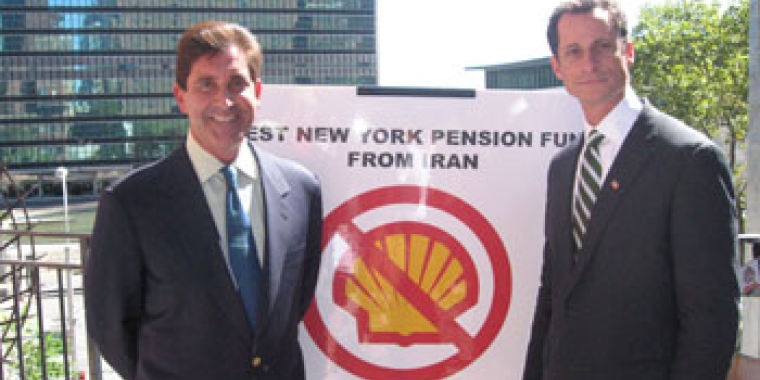
Weiner And Klein Call For Divestment From Iran
Jeffrey D. Klein
September 23, 2007

NEW YORK – On the eve of Iranian President Mahmoud Ahmadinejad's visit to New York City, Rep. Anthony Weiner (D-Brooklyn & Queens) and State Senator Jeff Klein (D-Bronx & Westchester) stood at the United Nations today and called for New York State and New York City pension funds to divest of all investments in Iran.
Rep. Weiner, a member of the House Energy and Commerce Committee and Sen. Klein, the Deputy Minority Leader also released a list of 22 international companies that were investing in Iran's energy sector and thus helping to support that nation's exporting of terrorism and its drive for nuclear weapons.
Weiner and Klein called for New York State and New York City to join Florida, Illinois, Louisiana, Ohio and Los Angeles and divest from all companies that invest in Iran's energy sector. California's legislature has passed similar legislation which awaits signature from the Governor of California. At least 14 other states have similar legislation pending.
"Investing in Iran is dangerous business and it is immoral," said Rep. Weiner. "It can only be interpreted as using the retiree savings of New Yorkers to make the next generation's world less safe. We are funding a terrorist state."
"In this century we face a different kind of enemy than in previous times. Americans should not be financiers of a war against ourselves. As citizens of New York we can show that we are still as united against terrorism as strongly as we were on September 11, but New York's future can not be in conflict with the crusade for moral righteousness that this country faces on a daily basis. It is our responsibility to oppose the specter of terrorism that looms large over our families and our future by immediately divesting our finances from terrorist states," said Senator Klein.
It is illegal for companies owned by United States interests to invest in Iran's energy sector, but it is legal for U.S. individuals and funds to invest heavily in foreign entities that have heavy presences in Iran. Among the most familiar names on the Weiner/Klein list is Royal Dutch Shell and Lukoil. Both companies have retail outlets in New York City .
Iran remains the most active state sponsor of terrorism and presents a particular concern because of its continued development of a nuclear weapons program and its efforts to destabilize Iraq. Like other state sponsors of terrorism with WMD programs, Iran could support terrorist organizations seeking to acquire WMD. Further, Iran continues to support the use of terror by Hamas and Hezbollah with extensive funding, training and weapons that are used against Israel. Iran also continues to be unwilling to bring to justice senior Al-Qaeda members that have been detained and resisted numerous calls to transfer custody of these detainees to third parties for interrogation or trial.
Q. How much State and City money are we talking about here?
A. My staff reviewed all assets held by the New York State Common Retirement Fund (NYSCRF) as of March 31, 2006 ( http://www.osc.state.ny.us./retire/word_and_pdf_documents/publications/cafr/asset_listings_06.pdf ) and found the fund held at least 9 of the 22 oil and petroleum companies on today's list. It held close to $545 million in these companies' stock. The largest holding from these 9 stocks was $210 million in Royal Dutch Shell. Second was Total, France with close to $167 million. Lukoil, Russia was #6 with $25 million of NYSCRF investments.
While complete numbers for investments in the New York City pension funds are not publicly available, we know that the NYC Teachers Retirement Fund has $5.5 million invested in Royal Dutch Shell.
These 22 companies have signed agreements to invest at least $20 million to enhance Iran's energy resources in a given year since August 1996. These companies may be in violation of the Iran Sanctions Act.
In mid-2005, Shell handed over the two developed fields to Iran after development difficulties forced the company to halt production. Shell, however, remained involved in the marketing of the oil from the fields.
§ Shell is also involved in negotiations with the Iranian government and China's Sinopec regarding a 20% equity stake in the Yadavaran oil field in southern Iran.



